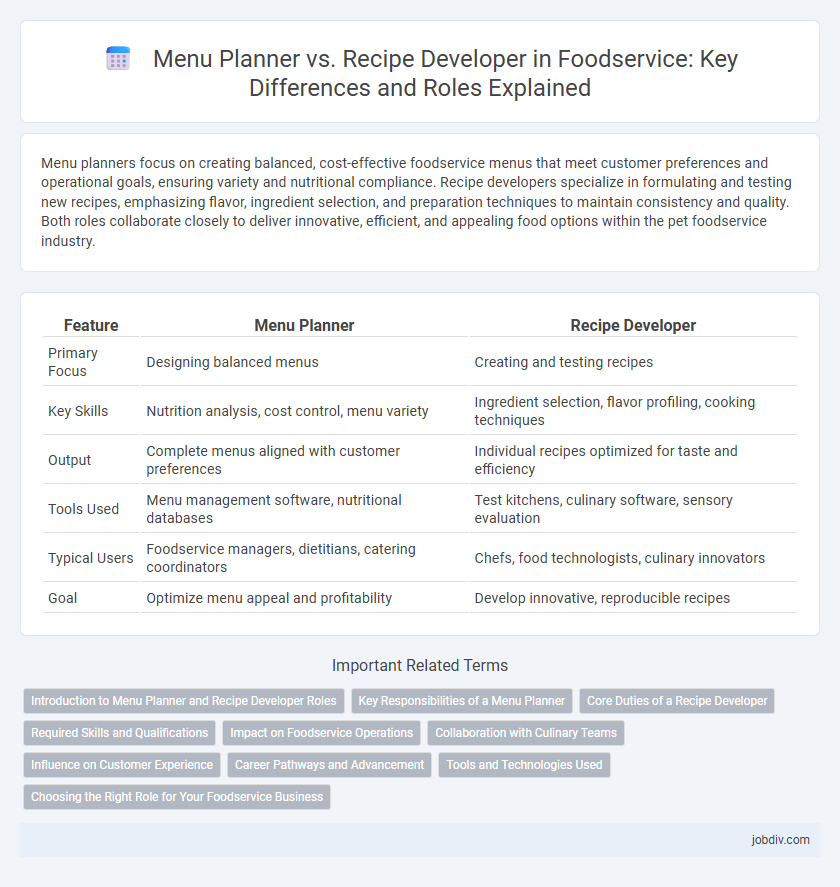Menu planners focus on creating balanced, cost-effective foodservice menus that meet customer preferences and operational goals, ensuring variety and nutritional compliance. Recipe developers specialize in formulating and testing new recipes, emphasizing flavor, ingredient selection, and preparation techniques to maintain consistency and quality. Both roles collaborate closely to deliver innovative, efficient, and appealing food options within the pet foodservice industry.
Table of Comparison
| Feature | Menu Planner | Recipe Developer |
|---|---|---|
| Primary Focus | Designing balanced menus | Creating and testing recipes |
| Key Skills | Nutrition analysis, cost control, menu variety | Ingredient selection, flavor profiling, cooking techniques |
| Output | Complete menus aligned with customer preferences | Individual recipes optimized for taste and efficiency |
| Tools Used | Menu management software, nutritional databases | Test kitchens, culinary software, sensory evaluation |
| Typical Users | Foodservice managers, dietitians, catering coordinators | Chefs, food technologists, culinary innovators |
| Goal | Optimize menu appeal and profitability | Develop innovative, reproducible recipes |
Introduction to Menu Planner and Recipe Developer Roles
Menu planners design balanced, cost-effective menus tailored to target customer preferences and dietary requirements, ensuring operational efficiency and profitability in foodservice establishments. Recipe developers create, test, and perfect recipes to maintain consistency, enhance flavor profiles, and meet nutritional standards. Both roles collaborate to deliver cohesive dining experiences that align with brand identity and market trends.
Key Responsibilities of a Menu Planner
Menu Planners analyze market trends, customer preferences, and nutritional guidelines to create diverse, cost-effective menus that optimize foodservice operations. They collaborate with chefs, suppliers, and nutritionists to balance menu variety, ingredient availability, and budget constraints while ensuring compliance with dietary standards. Menu Planners also forecast inventory needs and adjust offerings based on seasonality and special events to maximize profitability and customer satisfaction.
Core Duties of a Recipe Developer
A recipe developer designs and tests innovative dishes to align with specific culinary concepts and dietary requirements, ensuring consistency in flavor, presentation, and portion control. They collaborate closely with chefs and nutritionists to create recipes that meet nutritional standards while optimizing ingredient costs. Their core duties include standardizing recipes, conducting sensory evaluations, and adjusting preparations based on customer feedback and food safety regulations.
Required Skills and Qualifications
Menu planners require strong analytical skills and knowledge of nutrition to design balanced menus that meet dietary guidelines and customer preferences. Recipe developers need culinary creativity and expertise in ingredient functionality to innovate and refine recipes that align with foodservice trends and operational capabilities. Both roles demand excellent communication skills and experience in food safety standards to ensure quality and compliance.
Impact on Foodservice Operations
Menu planners streamline foodservice operations by designing balanced, cost-effective menus that optimize ingredient use and reduce waste. Recipe developers enhance operational efficiency through precise recipe creation, ensuring consistency in taste, portion control, and preparation time. Together, their roles improve inventory management and customer satisfaction by aligning culinary creativity with practical service demands.
Collaboration with Culinary Teams
Menu planners work closely with culinary teams to align meal offerings with customer preferences, nutritional guidelines, and operational efficiency, ensuring cohesive menu strategies. Recipe developers collaborate directly with chefs to create innovative, scalable dishes that meet quality standards and can be consistently executed in commercial kitchens. Effective collaboration between menu planners and recipe developers enhances menu innovation while maintaining cost control and food safety compliance.
Influence on Customer Experience
Menu planners strategically design food offerings to meet diverse customer preferences and dietary needs, directly enhancing satisfaction and repeat patronage. Recipe developers innovate and refine dishes that ensure consistent taste, quality, and presentation, which significantly impacts the perceived value and enjoyment of the meal. Together, their roles shape a cohesive dining experience that aligns culinary creativity with customer expectations in foodservice operations.
Career Pathways and Advancement
Menu planners strategically design diverse food offerings to enhance customer satisfaction and operational efficiency, often advancing into roles like foodservice directors or culinary managers. Recipe developers specialize in creating innovative dishes by blending culinary creativity with nutritional knowledge, potentially progressing to positions such as product developers or culinary consultants. Both career pathways offer opportunities for leadership and specialization within the dynamic foodservice industry.
Tools and Technologies Used
Menu planners utilize advanced software like digital menu design platforms and data analytics tools to optimize item selection based on customer preferences and inventory. Recipe developers rely on culinary innovation software, nutritional analysis programs, and lab-scale cooking equipment to create precise, scalable recipes. Both roles increasingly integrate AI-powered systems to enhance creativity, accuracy, and operational efficiency in foodservice settings.
Choosing the Right Role for Your Foodservice Business
Menu planners analyze target customer preferences and operational costs to design strategic menus that optimize profitability and efficiency in foodservice businesses. Recipe developers focus on creating innovative, standardized recipes that ensure consistency, quality, and scalability across kitchen operations. Selecting the right role depends on whether your priority is managing overall menu structure or refining dish-level culinary creativity and execution.
Menu Planner vs Recipe Developer Infographic

 jobdiv.com
jobdiv.com